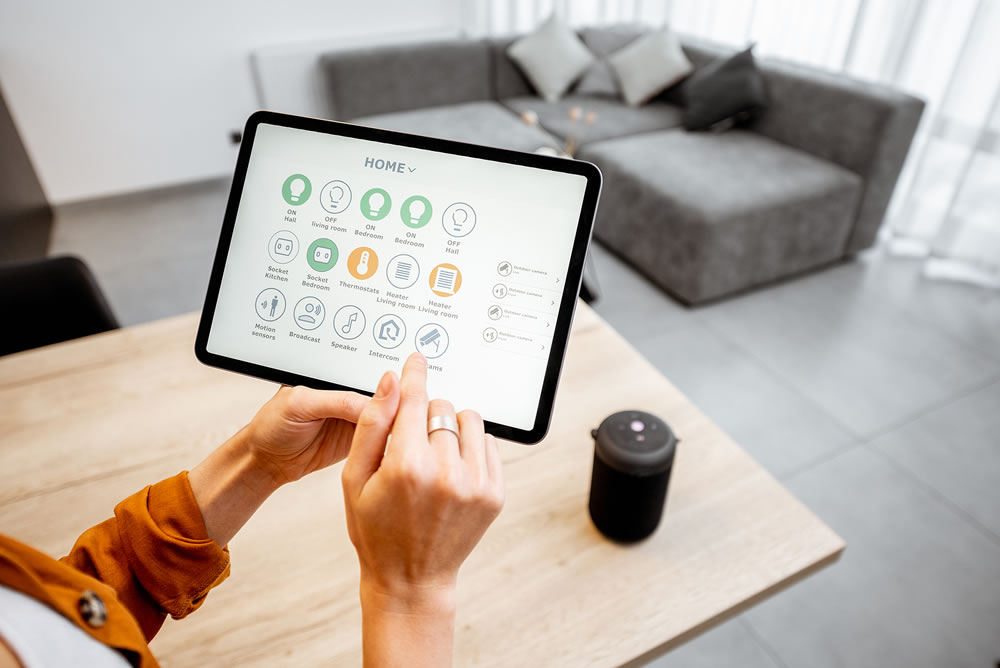In a world where convenience and accessibility have become some of the most sought-after qualities in just about every area of our lives, it has perhaps come as no surprise to see smart home systems come into their own over recent years. Allowing homeowners to control everything from their lighting and heating to their entertainment systems through a mobile app even before they have walked in the front door, there’s no denying that they have transformed the way we live. And, providing maximum comfort and ease at all times, which is just what you’d expect from the perfect luxury home, today, we simply couldn’t live without them.
If you’re yet to venture into the world of smart home systems, then your life could be about to get a whole lot easier, because once you’ve tried them, you’ll never want to go back. Here, we take a look at just how they have become such a highly sought-after element of luxury living – and why you should consider making the upgrade, sharpish.

Benefits of a smart home
So, what exactly is in a smart home for you – and what’s all the fuss about? Well, to put it in simple terms, having a smart home is like having an invisible maid at home, with the most comprehensive of systems able to complete all manner of tasks on your behalf – from closing the blinds or optimising your inside temperature, to automatically lowering the volume of your music when a guest comes in. It can even answer your phone via a smart speaker while you play your favourite online games (Crazy Time fans, we’re looking at you). Ultimately, having a smart home system can save you time and ensure that your day to day life runs more smoothly, which is perfect for those who have busy lifestyles – plus, it feels pretty good to be looked after in such a way, without the need for live-in staff.
How to get started building your smart home
Decentralised management
The devices and networks of smart homes can be classified into two groups according to their style of management – decentralised, and centralised.
Decentralised networks most often communicate over a Wi-Fi network, although this is not always the case, as there are also devices that work via Bluetooth or GSM / GPRS networks. What they have in common is that all devices can be connected and operated in the same way, even as stand-alone units, without any other central units required. Wi-Fi communication is characterised by high data density communication, which means that a lot of information can be carried on it, but a disadvantage is that the device has a significant power requirement, so it usually requires a mains power source. They can also be tricky to automate, and require various manufacturer apps to be installed on your smart device, depending on how many appliances you wish to connect.

Centralised management
A common feature of devices using a centralised network is that, regardless of their own method of communication, a central unit, called a gateway, is always required for their operation. These devices are the brains of centralised smart homes and connect to the internet through your home network, as well as to other smart devices you wish to use.
While each unit in a decentralised network must be connected to the internet separately, a centralised network does not burden the home Wi-Fi router with five, ten, or even more new devices. Only one device, the central unit, needs to be served by the router, which means if you’re working from home and need to preserve your bandwidth, it has you covered. Using a ‘mesh’ network means that the central unit can function as a signal transmitter, providing greater network coverage, and as they have been developed with automation in mind, devices can communicate effectively with one another regardless of whether or not they are connected to a power source or internet service.
Choosing a centralised system also means that you’ll only need to download one app from which to control everything, so if you’re forever battling with a full memory on your smartphone or tablet then it’s a great way to free up some space.
Do bear in mind, however, that as not all manufacturers support all devices, you may encounter some hurdles which mean you can’t connect and make use of all the devices you’d like to, and that home centres vary greatly in function – so be sure to do your research carefully and choose the one best suited to your needs beforehand.
The bottom line
Setting up a smart home system might sound complicated, but in reality, the biggest decision you’ll have to make is whether to centralise or decentralise your operations. Once you have everything connected, your life will become easier and run more smoothly than ever before – and you’ll wonder why you didn’t take the plunge sooner.
The post Everything you need to know about smart home systems first appeared on Luxury Lifestyle Magazine.